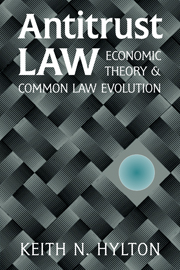Book contents
- Frontmatter
- Contents
- Preface
- 1 Economics
- 2 Law and Policy
- 3 Enforcement
- 4 Cartels
- 5 Development of Section 1 Doctrine
- 6 Rule of Reason and Per-Se Rule
- 7 Agreement
- 8 Facilitating Mechanisms
- 9 Boycotts
- 10 Monopolization
- 11 Power
- 12 Attempts
- 13 Vertical Restraints
- 14 Tying and Exclusive Dealing
- 15 Horizontal Mergers
- 16 Mergers, Vertical and Conglomerate
- 17 Antitrust and the State
- Index
2 - Law and Policy
Published online by Cambridge University Press: 12 November 2009
- Frontmatter
- Contents
- Preface
- 1 Economics
- 2 Law and Policy
- 3 Enforcement
- 4 Cartels
- 5 Development of Section 1 Doctrine
- 6 Rule of Reason and Per-Se Rule
- 7 Agreement
- 8 Facilitating Mechanisms
- 9 Boycotts
- 10 Monopolization
- 11 Power
- 12 Attempts
- 13 Vertical Restraints
- 14 Tying and Exclusive Dealing
- 15 Horizontal Mergers
- 16 Mergers, Vertical and Conglomerate
- 17 Antitrust and the State
- Index
Summary
This chapter introduces some fundamental legal, historical, and policy issues in antitrust law. My aim is not so much to report the details as to give the reader a few simple explanations of the relationship between the Sherman Act and its historical roots, reasons for the enactment of the antitrust laws, and the policy issues recurring in antitrust cases.
The focus of this chapter is the Sherman Act. The important parts of the statute are as follows:
Section 1: Every contract, combination in the form of trust or otherwise, or conspiracy, in restraint of trade or commerce among the several States, or with foreign nations, is declared to be illegal. Every person who shall make any contract or engage in any combination or conspiracy hereby declared to be illegal shall be deemed guilty of a felony, and, on conviction thereof, shall be punished by fine not exceeding [$10 million] if a corporation, or if any other person, [$350,000], or by imprisonment not exceeding [3 years], or by both said punishments, in the discretion of the court.
Section 2: Every person who shall monopolize, or attempt to monopolize, or combine or conspire with any person or persons, to monopolize any part of the trade or commerce among the several States, or with foreign nations, shall be deemed guilty of a felony [and is similarly punishable].
SOME INTERPRETATION ISSUES
Conspiracy, Section 1, and Section 2
We can contrast the two important sections of the Sherman Act by comparing the elements of a conspiracy charge.
- Type
- Chapter
- Information
- Antitrust LawEconomic Theory and Common Law Evolution, pp. 27 - 42Publisher: Cambridge University PressPrint publication year: 2003



